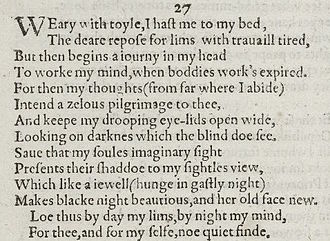Sonnet 27
Q1
Q2
Q3
C
Weary with toil, I haste me to my bed,
The dear repose for limbs with travel tired;
But then begins a journey in my head,
To work my mind, when body’s work’s expired:
For then my thoughts, from far where I abide,
Intend a zealous pilgrimage to thee,
And keep my drooping eyelids open wide,
Looking on darkness which the blind do see:
Save that my soul’s imaginary sight
Presents thy shadow to my sightless view,
Which, like a jewel hung in ghastly night,
Makes black night beauteous and her old face new.
Lo, thus, by day my limbs, by night my mind,
For thee and for myself no quiet find.
4
8
12
14
Sonnet 27 is one of 154 sonnets written by the English playwright and poet William Shakespeare.
Sonnet 27 is an English or Shakespearean sonnet. The English sonnet consists of three quatrains followed by a couplet, having the rhyme scheme abab cdcd efef gg, and is written in iambic pentameter, a type of poetic metre based on five pairs of metrically weak/strong syllabic positions. Line thirteen exhibits a regular iambic pentameter:
Sonnet 27 is part of the Fair Youth sequence, in which the poet expresses his love towards another Man. Sonnet 27, when written using modern spelling, is Shakespeare's only pangrammic sonnet. It forms a diptych with Sonnet 28 which continues it.
For another of Shakespeare's sonnets dealing with night, sleep, and dreams see Sonnet 43.
...
Wikipedia

